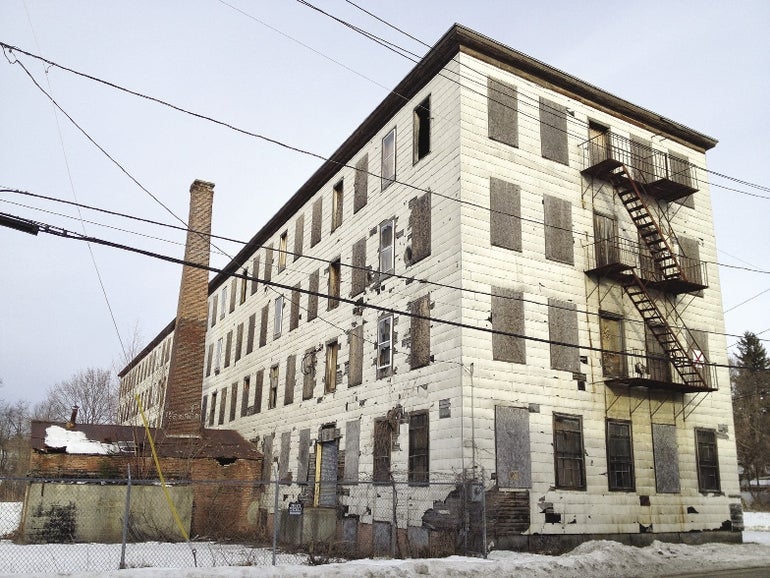Private housing developers are stepping up to take on once- thriving, but now-abandoned industrial buildings that have created blight in the Central Massachusetts communities where they used to attract workers to a century ago.
The buildings, typically three or four stories tall, aren’t useful for much beyond warehouse storage in today’s changed manufacturing world. But by turning them into housing units, the developers are helping boost the tax bases and morale of those towns left behind in the shift out of a manufacturing-based economy.
“You basically have a stock of beautiful and historic buildings that are sitting there empty, that are sitting there underutilized and are deteriorating before our eyes,” said Gilbert Winn, managing principal of Winn Development, which renovated Worcester’s former Chevalier Furniture building on Water Street into the Canal Lofts in 2011.
Meanwhile, in Leominster, two Adams Street properties that have been mostly abandoned for decades are getting new life, thanks to two local developers.
“These are old buildings … they’re ugly, they’re overgrown. It just drags down the whole area,” said Lisa Marrone, Leominster’s economic development coordinator. “Converting these buildings into housing or other repurposing … it uplifts the whole neighborhood.”
James Whitney, of J. Whitney Development in Leominster, is renovating two buildings at 98 Adams St. One will have 42,000 square feet of commercial space, the other 88,000 square feet of residential space, divided into 52 apartments. Whitney is responsible for other developments in the city, most recently turning a 42,000-square-foot former mill on Spruce Street into office space.
“This is pretty much the last area in town that’s got these buildings,” he said.
Whitney has fixed the windows and masonry openings on the buildings and plans to paint soon.
“We’re working on the outside of the residential building grounds, but we’re not doing any interior work. We’re just cleaning it up for curb appeal,” he said. The first focus will be the commercial building. He expects work on the residential side to begin sometime next year.
Like Marrone, Whitney sees his projects as benefitting the overall area.
“The one that we did on Spruce Street just triggered a complete neighborhood cleanup, and this will do the same thing,” he said.
Marrone said Whitney’s project helped build momentum that led to another abandoned building — originally a piano factory — finding a developer. Last month, Edmond Plante, of Bolton, received site plan approval from the city’s planning board for 46 market-rate units he hopes to construct at 140 Adams St.
Plante declined to give many details about his project, but said he’s working to get the appropriate permits and approvals, and is talking with MassDevelopment to determine what types of funding might be available.
Developers say these types of projects aren’t financially viable without government funding.
“It’s really with the help of the government that you’re able to make the numbers work,” Winn said.
Matthew W. Mittelstadt, managing director of EA Fish Development of Braintree, which developed the 75-unit Linwood Mill Apartments in Northbridge for people ages 55 and older, said his $18.5-million project had 10 different funding sources and received various federal and state tax credits.
Despite the complicated financials of these types of developments, developers say it’s still better to work with the existing structures than to tear them down.
“You get some beautiful units with high ceilings, exposed brick, both inside the unit and common areas. It just wouldn’t be feasible to build that design,” Mittelstadt said, adding that the saying “they don’t make them like they used to” is accurate in referring to these buildings.
Winn said that with renovations, the development process is more efficient, and planning and zoning work, which can otherwise take months, is already done.
“It’s a safer bet in some ways to start with an existing building. It lessens the risks,” he said.
And it’s not just industrial buildings that are attracting developers. Winn is turning the former Worcester Vocational Technical High School into 84 family-friendly apartments, half of which will rent for market rate; the other half for low-income renters. Construction on the $20-million project is expected to start in February.
“It’s not always mill buildings or factory buildings,” he said. “We’ll look at everything.” Winn said it comes down to how the buildings are constructed and how efficient they are designed.
Winn, whose company has apartments in more than 40 Bay State cities and towns, said communities are rarely opposed to redeveloping industrial buildings into housing. Even commercial real estate brokers see it as a positive.
Edward K. Renaud, commercial broker for Prudential Prime Properties in Northbridge, said the conversion of commercial buildings into residential units means less commercial space is available, which can drive up the cost of commercial property. But developments like Linwood Mill, which opened almost a year ago, shouldn’t negatively impact the commercial market much because there’s so much available property, he said.
Renaud said the conversion of the mill was ideal for the property, which is mostly surrounded by other housing and the Mumford River, just off Route 122. He added that buildings like it aren’t attractive to most companies as business properties today, because they aren’t energy efficient, may only have one freight elevator and often lack adequate parking.
But he’s optimistic that the redevelopment will attract businesses looking to set up shop in the area, too.
“They want to make sure that there’s reasonable housing for the people that work for them,” he said.
Read more

